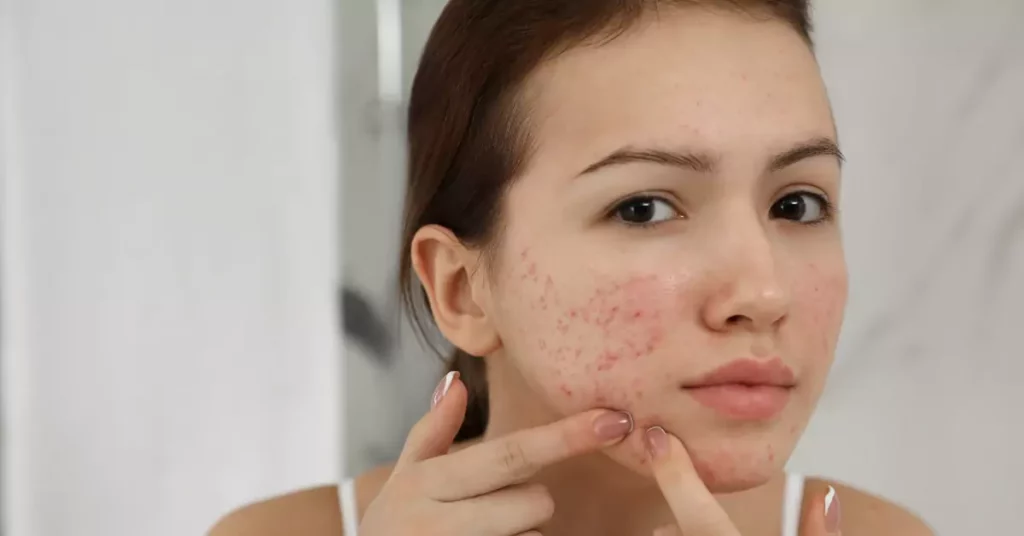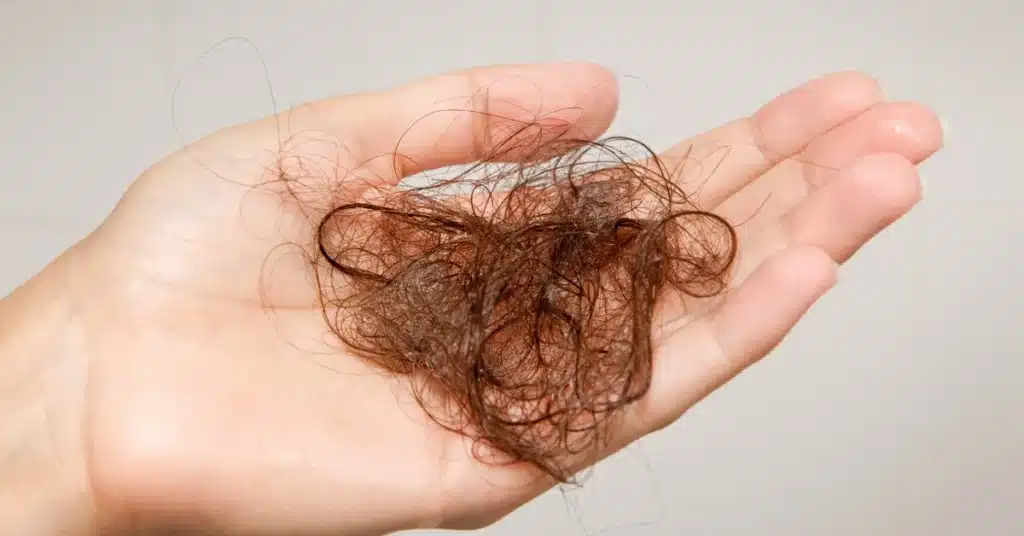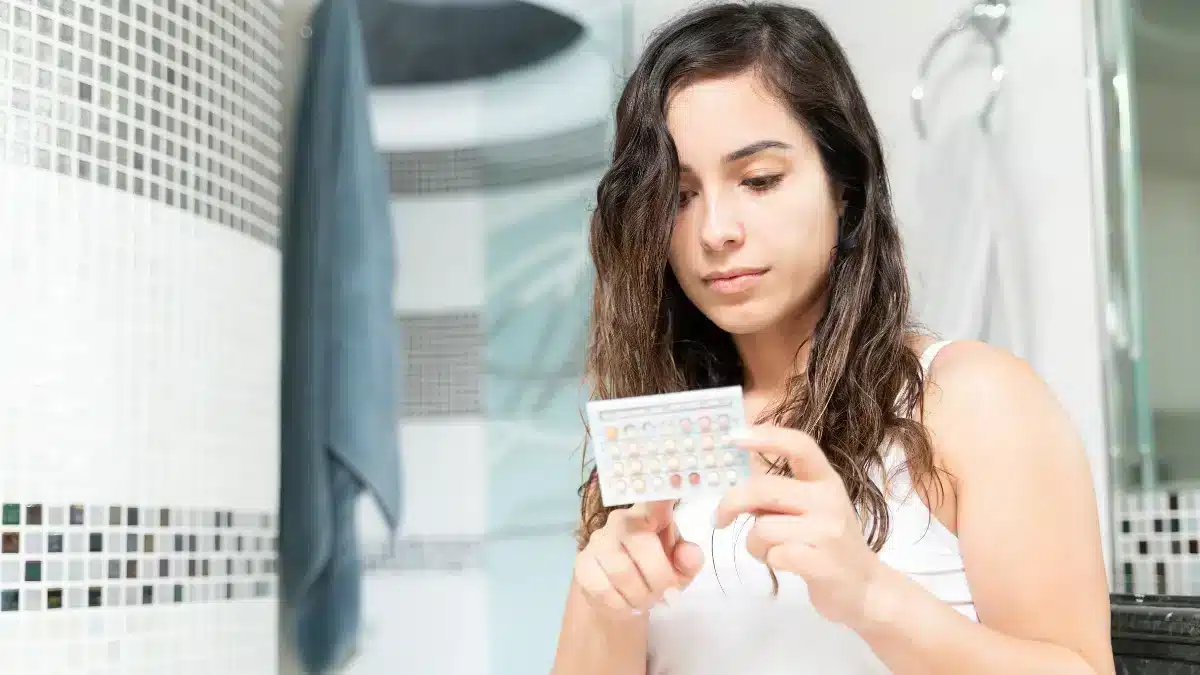Post-Birth Control Syndrome: A Reality Related to Birth Control
Post-Birth Control Syndrome (PBCS) is a set of symptoms that can occur after stopping hormonal birth control methods, such as the pill, IUDs, implants, and vaginal rings.
The term has been used for over a decade to describe negative post-birth control effects.
While PBCS is not an official medical condition, the symptoms experienced by women after stopping hormonal birth control are real and can be concerning.
However, these symptoms can be temporary and do not necessarily signify a serious condition.
This article explores a few Post-Birth Control Syndrome symptoms, potential causes, duration, and treatment options.
Post-Birth Control Symptoms
Symptoms of PBCS can vary among women and may include:
Acne

Post-Birth Control Syndrome (PBCS) can cause acne after stopping birth control.
Going off of hormonal contraceptives will potentially cause hormonal changes and may increase the skin’s oil production.
Therefore, stopping birth control can lead to an increase in adult sebum production.
Overproduction of sebum can contribute to acne.
Amenorrhea
PBCS can cause Amenorrhea, which is the absence of menstruation, persisting for 3-6 months after stopping hormonal birth control.
This condition is also referred to as Post-pill Amenorrhea.
Blood sugar dysregulation
Hormonal contraception has been associated with Insulin and glucose resistance, and the body may not adequately respond by increasing beta-cell function.
This can create further health problems after going off the pill, too.
To manage blood sugar dysregulation, it is advisable to maintain a whole foods diet high in fresh produce, macronutrients, and fiber.
This diet is necessary for hormone production, stress response, and the return of ovulation.
Depression, anxiety, and other mood symptoms
Hormonal birth control alters the body’s natural hormone levels and suppresses ovulation.
These hormonal fluctuations can trigger or worsen anxiety.
When a woman stops using hormonal birth control, it can take time for her natural hormone levels to return to normal.
This can lead to the symptoms associated with PBCS, including mood-related issues.
Gut dysfunction
Hormonal birth control can disrupt normal gut flora and impact gut health negatively.
It can take a few weeks or months for the gut flora to recover after stopping hormonal birth control.
Hair loss

When a woman stops using hormonal birth control, it can take time for her natural hormone levels to return to normal, which can lead to the symptoms associated with PBCS, including hair loss.
It is a condition that involves an abrupt onset of hair shedding, usually several months after experiencing a triggering event, such as stopping hormonal birth control.
When hair follicles reach the resting phase too soon, it causes Telogen Effluvium, which intensifies hair loss.
These and most other PBCS symptoms can vary among women and may last for a month or two, but it can take up to six months for some.
Causes of Post-Birth Control Syndrome
The exact cause of PBCS has yet to be fully understood.
Still, it is believed to be related to the sudden change in hormone levels when stopping these contraceptives.
Hormonal contraceptives suppress the body’s natural reproductive processes.
When their use is discontinued, the body adjusts to changing hormone levels.
This adjustment process may trigger the symptoms associated with PBCS.
Individual susceptibility factors may also contribute to the development of these symptoms.
How long does Post-Birth Control Syndrome last
The resolution period varies among individuals
Post-Birth Control Syndrome symptoms generally arise within the first 4-6 months after stopping hormonal birth control.
These symptoms usually resolve on their own within a month or two for many women, while it can take up to six months for some.
In contrast, others may need more long-term support.
Hormonal issues that may drive PBCS can sometimes be resolved by addressing the underlying hormonal imbalances.

Looking for a reliable and convenient solution for confident family planning?
Get the best oral contraceptives from WowRx now
YasminFemilonPost-Birth Control Syndrome treatment
Post-Birth Control Syndrome (PBCS) symptoms can be treated by addressing the underlying hormonal imbalances.
Hormonal medication is the only clinical treatment likely to make a big difference.
A doctor can still help with symptoms.
For example, prescription-strength medicines can be used to treat acne.
Usually, the doctor will test an individual’s blood for hormonal imbalances.
Once assessed, they will then advise various ways to alter the lifestyle.
This may include activity changes, supplement recommendations, and referrals to other practitioners like nutritionists.
Different signs can be treated in different ways.
Conclusion
Post-Birth Control Syndrome (PBCS) highlights the real and varied symptoms women may experience after discontinuing hormonal birth control.
Although not formally acknowledged as a medical condition, notable manifestations of PBCS include acne, Amenorrhea, dysregulation of blood sugar, mood disturbances, gastrointestinal dysfunction, and hair loss.
These symptoms, linked to hormonal imbalances, may last for a month or up to six months for some individuals.
Managing PBCS involves addressing underlying hormonal imbalances through a thorough and fully detailed process, including lifestyle adjustments and, if necessary, hormonal medications.
Treatment may vary based on specific symptoms, ranging from prescription-strength medications for acne to supporting natural hormone detoxification.
Awareness of PBCS is crucial for informed decision-making regarding birth control and women’s health.
Frequently Asked Questions
How long is the Post-Birth Control Syndrome?
The duration of Post-Birth Control Syndrome (PBCS) varies among individuals. Some may experience symptoms for a few weeks, while others may endure them for several months. It is essential to consult with a healthcare expert for personalized guidance on managing and understanding the timeline of PBCS.
What are the side effects of going off birth control?
Going off birth control may cause hormonal fluctuations, leading to irregular periods, mood swings, and acne. Some may experience changes in libido, weight, or breast tenderness. Fertility can return quickly, but conception may take time. Consult a medical expert for personalized advice on managing potential side effects.
How do you fix Post-Birth Control Syndrome?
Addressing Post-Birth Control Syndrome involves a holistic approach. Prioritize a nutrient-rich diet, exercise, and stress management to regulate hormonal balance. Consult a doctor for personalized guidance, considering underlying health conditions and individual needs. Gradual lifestyle adjustments and medical advice can help alleviate symptoms and restore well-being.
Can PBCS affect fertility?
While there is limited direct research on the link between PBCS and fertility, some indirect evidence suggests potential effects. PBCS is believed to occur because hormonal birth control alters the body’s natural hormone levels and suppresses ovulation, which can temporarily affect fertility.
WowRx uses only high-quality sources while writing our articles. Please read our content information policy to know more about how we keep our content reliable and trustworthy.






